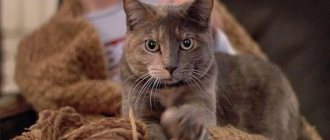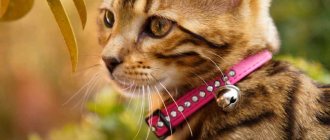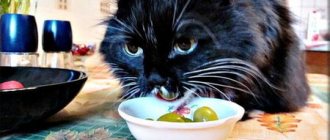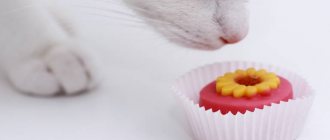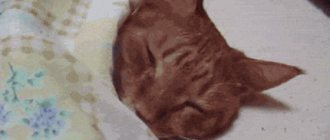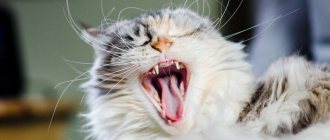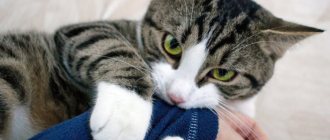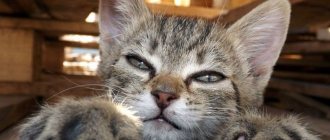What to do if a kitten clings to various objects, like a mother cat? How to wean him from this habit? The formation of the sucking reflex in kittens occurs in the first 6-8 days of their life. Like all mammals, cats receive all the necessary nutrients from their mother's milk during infancy. As they grow older, they switch to adult food. But it often happens that almost adult cats suck on a cat’s breast. And if the cat is not nearby, then they stick to objects (blanket, clothes, plaid, furniture, etc.).
Why do kittens stick to objects?
Neighbor cat fluffy blanket
In the first days of life, kittens find nipples by the smell and body temperature of the cat. After about 10-15 days (depending on the breed), their eyes open. The sucking reflex will be established during this period of life. Therefore, when sucking, they will be guided mainly by smell, tactile sensations, warmth, and not by sight or hearing.
The cat, as a rule, independently decides on the issue of stopping the “babies”’ access to milk. Therefore, it often happens that the milk has already run out, but the kittens still continue to suckle. A good cat is unaware of the possible consequences. Kittens teething can damage the skin of her nipples. Which is fraught with the entry of bacteria and infections into the wound. Some cats do not prevent sucking. This leads to the fact that babies’ sucking reflex is delayed for a long time.
It often happens that a relatively adult kitten is taken by new owners. He begins to see “mother” in other objects. It purrs, moves its paws and clings, for example, to a blanket, to a rug, to clothes, to a person’s body. The main reasons for this behavior:
- Early weaning of a kitten from its mother cat
- Lack of care and warmth from the owner
- Breed predisposition and genetics
- Congenital pathologies, developmental problems
- Ordinary boredom
- Hunger (if the pet is bottle-fed)
- Stress
- Poor diet
Facts about the sucking reflex
Sucking is an indicator of the newborn's vitality and health, a method of nutrition, as well as the first experience of communication and knowledge of the world. According to zoologists:
- An active kitten, barely born, instinctively crawls to the warm mother's belly, independently finds the nipple and greedily sucks in the precious colostrum. Small and weakened babies suck poorly or are not able to suck at all, which indicates their low vitality and possible developmental defects.
- Sucking is not only the process of absorbing food, but also the establishment of a strong emotional connection with the mother, and the creation of the first psychological associations. While sucking, the kitten is in a state of peace and comfort and, having had enough, calmly falls asleep.
- The warmth of the native nest, licking by the mother's wet tongue, the smell of milk and its taste are included in the complex of first sensations of a baby kitten that has just begun its life's journey. The mother cat and littermates are the first creatures with which the baby interacts and communicates.
- Sucking contributes to the development of the kitten’s vestibular apparatus and coordination of movements: just observe what exotic positions the babies take in order to get to the life-giving source on the mother’s stomach. Subsequently, sucking skills are transformed into the ability to capture and hold prey in the mouth, as well as cut it up.
- Having opened its eyes and learned to walk, the kitten begins to more actively explore the world around it and does this with the help of its mouth and limbs. Having gently touched the paw pad and made sure that the object is safe, the baby will most likely want to taste it, trying to suck and chew at the same time.
How to properly wean a kitten from cat sucking?
Kittens feed on mother cat's milk
When kittens are 9-12 weeks old, mother cat's lactation period usually comes to an end. During this period, it is important to accustom them to adult food. Most cats try not to nurse on their own. To do this, they lie on their stomachs, move their babies away from them, or try to lie down where the babies cannot reach her.
If this does not happen, then you can put a special blanket on the cat. Which will prevent babies from accessing her breasts.
Instead, as they grow older, babies are periodically separated from the cat. For example, they take you out of the room for a while and close the door. At this time, they are given bowls with cat milk replacer. Gently poke the pets with their nose. So that when they lick the milk from their faces, they feel its taste. And they showed interest in the contents of the bowls when they got hungry. Cat milk replacer should be at room temperature or warmer. Gradually increase the time the “children” are alone. Don't leave them alone, it's stressful for them. Talk affectionately, take them off, sometimes stroke them, give them toys, pick them up. So that they get used to the person and do not feel loneliness.
Kittens are introduced to solid food gradually. There are special mixtures and liquid foods for newborns and small kittens. Up to two months you need to feed four times a day. Regardless of their consumption of mother's milk. After 6 months, the child is gradually transferred to solid food and the frequency of meals is reduced. In addition to special food, you can give boiled chicken and minced veal (depending on the breed). After about a year, cats are completely transferred to an adult diet.
It is possible to completely separate babies from their mother (in order to transfer them to another family) only after 2 months. Earlier weaning encourages the kitten to suck on objects and human clothing. He will look for his mother.
Stages of transferring an animal to normal food
To accustom a cat to normal food, you must follow certain instructions:
- 1. Dry food is replaced with a wet equivalent from the same manufacturer. The animal is accustomed to certain flavoring additives, so the transition will not be abrupt. At the same time, the soft version of the food contains fewer harmful components than the dry version.
- 2. Natural food is introduced into the cat’s diet gradually. You can prepare mixed porridges - semolina or oatmeal plus meat/fish. Your pet will not refuse such homemade food.
- 3. Fresh water must be freely available to the animal. Drinking plenty of fluids will help remove toxins from the body faster.
- 4. “Cat grass” grown on the windowsill will become an additional source of vitamins.
- 5. Gradually more and more natural products are added that the cat prefers. For example, if he likes boiled fish, then they give him that instead of food.
- 6. The amount of feed decreases every day. Not having enough, the cat will begin to eat from a nearby bowl, where healthy foods must be placed in a timely manner.
This plan of action allows the owners to gradually and without harm to the animal’s health transfer the pet from dry food to regular food, completely weaning it off Whiskas and eliminating the dependence.
How to wean a kitten from sucking objects?
Kittens love attention, care and affection.
If a cat jumps into your bed in the morning, purrs and interrupts with its paws, then this is a sign of trust and love for the owner. If at the same time she clings to a blanket saturated with the smell of a person, it means she considers him her patron and protector. But if sucking occurs in the absence of a person (and at other times of the day), then this indicates some problems. They need to be identified and eliminated.
First, try to review your diet. Perhaps your pet is lacking some nutrients. He tries to replenish the necessary elements through sucking objects. Replace the food, let the kitten try other flavors or food from other manufacturers. Use high-quality premium food labeled “For kittens.” Or with a note about age. The food in this segment includes all the microelements, nutrients, vitamins, and additives necessary for the baby’s growth and development.
Eliminate anything it sticks to. Do not leave clothes or blankets within the kitten's reach. Try to distract the cat by playing games or holding it in your hands or petting it. Provide your kitten with toys that he can play with in your absence. So that he doesn't get bored while you're at work.
If the cat shows interest in clothing, then it can be treated with essential oils with the scent of citrus, pine or menthol . But it’s better to put all your things in a closet or drawers. Do not scatter them around the room, on the sofa or bed.
It is recommended to contact your veterinarian if none of these methods help. Perhaps the problem of sucking and chewing various objects is associated with changing teeth or problems in the endocrine system.
Zoologists claim that in some cases, sucking is a consequence of the animal’s psychological trauma received at an early age. In this case, weaning will be useless. As a rule, any sucking goes away on its own within 3 years of the pet’s life.
Difficulties in switching to homemade food
The components of the feed are attractants and additives. These chemical components are designed to get the animal used to the treat. It is these elements that make it difficult to wean your pet off Whiskas. The largest number of such additives is in economy class feed.
By choosing such food, the owner develops an addiction in the animal from the first spoon.
In addition to addiction, dry food does not provide the animal with the required amount of vitamins and microelements, which leads to frequent pet illnesses. Manufacturers have learned to produce junk food without including the natural ingredients necessary for the full development of a cat.
What not to do?
You cannot shout at your pet or punish it.
You cannot swear, shout at the kitten, much less hit it . For him, this is additional stress, which will in no way help eliminate the problem. Do not create stressful situations for the animal. For harmonious development, like human babies, kittens must grow up in comfort, love, affection and care. They should have their own place (bed, house), toys, their own dishes, proper diet, water, toilet. They should receive attention and care from their owner. But in moderation. Animals do not like to be held a lot against their will. If the cat has sat on your lap and wants to go for a walk, don’t interfere.
Do not lubricate the cat's chest with any bitter or sour substances . Kittens can get poisoned or get an upset stomach. Such procedures are also not safe for the cat’s health. The skin of the nipples is delicate and can harm the cat's health.
Do not try to wean babies from sucking by spraying water. This will cause them to have a phobia of water in adulthood (there will be problems with bathing). Or they will form the wrong attitude towards the owner. Which they will fear rather than love.
Why is it dangerous?
If the pet then starts eating the owner's things, the risk of intestinal obstruction increases. First of all, it is necessary to find out the reason for this behavior of the pet in order to exclude serious diseases. If the animal is healthy, then the worst thing is when the cat goes from sucking things to chewing and swallowing them. Which can lead to blockage of the esophagus and intestinal obstruction, and such conditions often result in death. If the fabric is synthetic or contains toxic dyes, the animal will develop severe intoxication.
What happens if a kitten is not weaned from sucking objects?
At first glance, sucking objects is a harmless procedure. Unlike the more typical cat behavior of eating house flowers or damaging furniture with their claws. However, this phenomenon has hidden threats. Indeed, in addition to wet areas (where the kitten has attached itself), there are other consequences.
When sucking on a blanket, rug, bedspread or other product, lumps of fabric will enter the stomach. This can cause digestive tract upset, vomiting, and abnormal bowel movements. In addition, fabric dyes are often very toxic and dangerous for the animal. Getting them inside is fraught with consequences.
By sucking on the same place, a cat can damage an object . When they suck an object, they simultaneously crush it with their paws. In this case, the kitten usually releases its claws. Unsharpened claws damage the fabric. And a place that has been sucked on many times in a row may remain stained by the animal’s mouth and tongue; the tissue will become damaged by repeated exposure to saliva.
Features of the transition to natural products
To facilitate the transition of the animal to natural food and wean it off Whiskas, it is necessary to include a complex of vitamins for the pet in the diet. Cats usually eat vitamin tablets with pleasure. In rare cases, a veterinarian may prescribe fortified formulations in the form of intramuscular injections.
It is worth considering the features of transferring an adult cat or kitten to normal food:
- 1. A small kitten cannot be weaned off its usual food by starvation. First, you need to transfer your pet to liquid food from bags, and then introduce other components into the diet. It is best to add new products instead of the usual food after active play with your pet.
- 2. An adult animal with a strong dependence on dry food can be left to fast for two days. The main thing is not to forget to give your pet water all the time. When very hungry, the animal will eat the natural product with pleasure based on the instinct of self-preservation.
When switching to healthy foods, we must not forget about the prohibition of mixing. The simultaneous intake of dry food and boiled meat or other product will lead to gastrointestinal diseases in your pet.
My cat sucks me - when should I worry?
If your kitten or adult cat sucks (kneads you frequently) from time to time, there is no need to worry because there are no consequences for this behavior.
On the other hand, if it is a more serious disorder, like all the behavioral disorders associated with early weaning ( cat biting , cat licking you , cat attacking , cat who loves you too much , cat who meows all the time , cat who not clean , then you will need to worry about it.Indeed, an adult cat that continues to suck very often may develop obsessive-compulsive behavior.
If your cat is constantly trying to nurse and her behavior seems excessive, I recommend you see a behavior educator.
My cat is sucking on his blanket
Cats who are deprived of their mother too early can breastfeed on soft, stretchy and warm materials that remind them of the softness and warmth of their mother's breast. In this way, they reduce their anxiety, stress, emotional deprivation or simply relieve their boredom.
Be careful because if your cat sucks on her blanket, clothing, towels, fabric or fur, she may ingest some or ingest certain fibers of the fabric. Then he may have serious health problems. If you have any concerns, notice unusual behavior, lack of appetite , vomissements , signs that make you think your cat is sick , I advise you to go and consult his veterinarian.
My cat sucks my ear or neck
If your cat weans too quickly, which doesn't give him time to get used to being breastfed, he will try to nurse you like you would his mother. Suddenly he will try to suck on parts of your body that remind him of his mother's breasts: neck, ears, fingers...
And, in addition to the behavioral disorder associated with early weaning, your cat is showing affection towards you by suckling you. In fact, he considers you his new mother and tries to breastfeed just like he did as a child.


